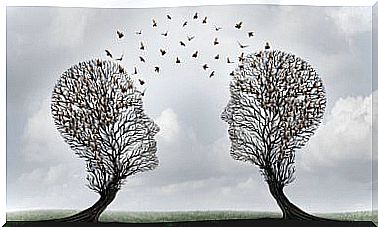Hypochondria: When The Fear Of Being Sick Becomes Reality

Hypochondria or health anxiety disorder (as the DSM-5 calls it) is one of the most frequent reasons for consultation for psychologists who perform psychotherapy. These are people who live with an intense and constant fear, which always revolves around having a disease.
The diseases most feared by people with hypochondria are usually those that involve a progressive and long deterioration over time (for example, cancer, HIV, fibromyalgia), although there are also cases of people who fear having a heart or respiratory disease (the which imply a more rapid and acute evolution).
That is, while in hypochondria the most characteristic is the fear of diseases that gradually deteriorate our body, the fear of faster diseases such as a heart attack or drowning is the most characteristic of Panic Disorder. In any case, regardless of the type of disease that the person with hypochondria fears, it is the actions that seek to control their body, their sensations and the way to manage fear that end up “making them sick” (psychologically speaking).

In other words, although the central components of hypochondria are fear of the disease and behaviors to achieve a diagnosis (medical tests, information search, etc.), there are more psychological factors that influence the development of this disease, the intensity and duration of it.
Therefore, in this article we will explain how the intense fear of people with hypochondria ends up becoming a reality, as a result of the search for control over their own body, the intolerance of uncertainty and the inadequate management of fear.
How does the fear of being sick attract the disease itself?
For a person with a fear of getting sick to end up developing hypochondria, several factors are needed. Among the most characteristic psychological factors that end up making this fear of being sick a reality, we find unrealistic expectations and preconceived ideas of how our human body has to function.
The role of unrealistic expectations, self-demand, and the need for control in the development of hypochondria
When a person has unrealistic and unfounded expectations of how their body should feel each day, any normal physical sensations such as a contracture, a jerk, or a non-specific pain turn into red flags that something is wrong. This is partly real, if my head hurts every day and I also have a strain on my neck, it is true that something is wrong with my body, pain and discomfort are signs. However, people with intense fear of the disease interpret these signs as unequivocal indicators that they are sick.
The fear of illness becomes greater if I have a mental scheme that tells me that: “when I feel something in my body, it tells me that something serious is happening and that I am sick”, this is how to have a preconceived idea of how my body has to function facilitates the development of hypochondria. This type of reasoning is quite common in people who have a low tolerance for bothersome physical sensations. They are people who believe that their body must always be in the same way (no new spots or moles), always without pain (no contractures or pulling) and always without discomfort (that they do not perceive anything “strange” or “new”).

In addition, although physical discomfort is normal and is part of being alive (our body is an organism in constant change), if we attend to them we end up amplifying them. This is explained by the “Theory of the double door of pain”, which has scientifically shown how to attend to a sensation in our body, all it does is amplify it, make it more intense and lasting over time. For this reason, distraction techniques are one of the keys to the success of the psychological treatment of hypochondria.
On the other hand, self-demand is a key factor in the development of hypochondria, because there must also be a high level of self-demand against the body itself and the disappearance of discomfort. That is, not only is it enough to be afraid of the disease and not bear normal physical discomfort, but also a high degree of self-demand and search for control appears for hypochondria to exist. The person has to think that the discomfort or uncomfortable sensation has to pass and sets an arbitrary date for it to be.
Avoiding being physically ill ends up being psychologically “ill”
The non-tolerance of annoying but normal physical sensations, together with requiring the body to stop feeling pursuing control of what happens in the body makes people “sick” psychologically. Since, since you cannot attend to two things at the same time, if someone is watching what hurts more or what hurts less, how much it hurts or where it bothers them, this person is therefore wasting a large part of their time in wanting to control the uncontrollable: the normal functioning of the organism.
Once the physical sensations have been amplified through attention to them, the person becomes more scared and begins to search the Internet or consult with doctors, to find out why he feels what he feels or what hurts him. In addition, the process of searching for information on the Internet is very dangerous, since it provides the person with a lot of information that they can later use to continue attending to the discomfort of their body and comment on what is known as a self-fulfilling prophecy.
On the other hand, going to the doctor and receiving a diagnosis of non-disease (because if it is hypochondria, there is no disease), all it does is temporarily calm the subject but makes him a slave to the professional’s opinion. And furthermore, it puts him in the position of sick, when performing tests and scans, the hypochondriac sees himself as a medical patient when he is not.
How we can correctly manage the fear of getting sick
Seeking the security of not being sick through different sources, without being convinced of what the professionals tell us and insisting that “I know I have something, even if they tell me otherwise” is not the right way. Our mind is very capricious and many times it “decides” to take the wrong path and makes us feel very safe about it. In the case of hypochondria, the person has to assume that with the information search strategies and medical tests, the only thing that he does is live directed by fear. You have to assume that you are wrong and that even if you think something is happening to you, it is not.

The fear of getting sick is normal and adaptive, we need to have a certain fear of getting sick in order to have healthy and protective behaviors. But looking for information that tells me that I am not sick is the wrong way to handle this fear. In the first place, the strategy of seeking control of physical sensations must be dropped and medical tests must be stopped so as not to find oneself in the sick role.
Second, it must be understood that the problem is not the fear itself, but the non-tolerance to this fear that grows bigger every time something is done so as not to feel it or appease it. It is very important to focus on the fact that the problem is not fear, but rather the way of managing that fear that develops hypochondria.
Taking all this into account, I want to tell you that a correct way to handle the fear of getting sick is to work on it, find out why it happens, what is gained from it, what can be done and above all, accept it. You can work with a psychologist to learn how to handle any of your fears, including the fear of getting sick. Because if you don’t manage it correctly, the fear of physical illness ends up leading to a psychological illness.









